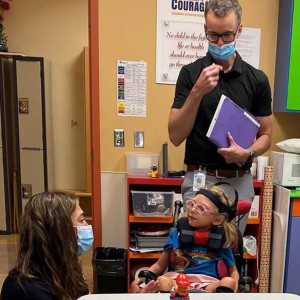Ground-Breaking Research Can Change the Lives of Kids with Disabilities
March 20, 2023 | News

KBHN-funded research is driving change for children living with neurodevelopmental disabilities and their caregivers.
Imagine a world where immobile children could activate their wheelchairs using nothing but brainwaves. Researchers are getting closer to this remarkable discovery by revolutionizing the lives of children affected by neurodevelopmental disabilities in Canada. The Strategic Investment Fund (SIF) launched by Kids Brain Health Network (KBHN) in partnership with Brain Canada in 2021, is bringing these scientific discoveries closer to reality through the allocation of $2.5 Million for research projects that will help thousands of kids and their families.
The Strategic Investment Fund was established to support new projects that demonstrate strong, near‐term potential to make a difference in the lives of children with neurodevelopmental disabilities and their families across Canada. The research projects span the areas of early identification, early intervention and effective evidence-based treatments, and family support. So far, the fund has aided research and programming at 39 research institutes and 53 health centers working directly to revolutionize children’s healthcare in Canada within these areas.
One project, aimed at helping children achieve mobility through brain-computer interfaces (BCIs), has seen previously immobile children begin to activate wheelchairs using nothing but their own brainwaves. This innovative development allows children to gain physical independence, providing them with a meaningful sense of self-empowerment.
According to Statistics Canada, immobility impacts over 50,000 children between the ages of two and seventeen. BCi-Move has the potential to help these children achieve autonomy in their day-to-day lives. The project is currently the only child and family‐centred pediatric BCI program in the world.

This project has provided new opportunities for children with severe disabilities to try to do something they never thought previously possible – move their body of their own volition,” said Dr. Adam Kirton, Pediatric Neurologist, Alberta Health Services. “These are very early stages, but long-term potential appears high as it has the ability to show that BCI can connect locked-in children with their world to accomplish goals that are personally meaningful to them.”
Among its many goals, BCi-Move will help determine if BCI can be used to achieve personal mobility goals through a customized three-month training program. Success will be measured by three pillars: individual goal achievement, skill progression, and quality of life.

KBHN has one goal, ‘helping children with neurodevelopmental disabilities (NDDs) and their families live the best lives’ and the Strategic Investment Fund helps us reach that goal,” said Nicola Lewis, CEO of Kids Brain Health Network. “With just two years in we are already seeing these exciting projects potential to have a profound effect on children and their caregivers’ health and wellbeing. We want to continue this work that will change the lives of Canadians taking care of kids with NDDs and we ask for continued support from the government to ensure this important work continues.”
What is often lost when helping children reach their full potential and live their best lives is how caregiving affects their loved ones. Another promising KBHN initiative focuses on helping family caregivers deal with the constant stress and mental health challenges of supporting their child by providing access to Acceptance and Commitment Training (ACT).
Caregivers who attended ACT workshops reported feeling less stressed, depressed, and isolated afterwards. The ACT model, which was developed together by caregivers and clinicians, represents a new frontier in co-design and co-deliverance between family members and medical experts.

“As a parent of an autistic child, I was able to apply psychological methods and my own lived experience to develop ACT workshops,” says Dr Kenneth Fung, Psychiatrist, Toronto Western Hospital. “Parents of children with autism double as their full-time caregiver and their own mental health is often not prioritized as the child’s wellbeing becomes the number one priority. ACT workshops allow parents to have a safe space to process their emotions, share challenges, and reclaim balanced, value-driven life directions. They leave the workshops empowered to apply mindfulness and ACT skills to improve their resilience and wellbeing, which often lead to better care outcomes for their children as well.”
The ACT program will constantly evolve to reflect the feedback of relevant communities in Canada. By continuing to monitor and adjust ACT workshops based on feedback from caregivers, as well as families of children with neurodevelopmental disabilities, the project will generate significant long-term insights into caregiving and its emotional ramifications.
The ACT program is especially crucial at a time where caregivers have been among the most impacted by the isolation of COVID-19 when virtually all additional support systems vanished. Many caregivers of children with NDDs experience deteriorating mental health and the pandemic further exacerbated the situation causing burnout and stress among parents and caregivers. KBHN wants to change that story with evidence-based solutions.
According to Statistics Canada, as many as 1.48 million children in Canada live with neurodevelopmental disabilities, which include autism spectrum disorder, fetal alcohol spectrum disorder and cerebral palsy. These disabilities deprive children of enjoying life’s most gratifying and essential activities, and strain families unable to afford round-the-clock assistance.
These breakthroughs in treatment and intervention not only give researchers optimism that they will comprehensively improve the lives of children with neurodevelopmental disabilities, they also help caregivers imagine a brighter future for their family.
The Strategic Investment Fund (SIF), which was established by KBHN and includes contributions from Brain Canada, among 16 other funding partners, will continue to fund cutting-edge ventures that improve the lives of children and their families. Funding from Brain Canada has been made possible by the Canada Brain Research Fund (CBRF), an innovative arrangement between the Government of Canada (through Health Canada) and Brain Canada Foundation. To date, Health Canada has invested over $145 million through the CBRF which has been matched by Brain Canada Foundation and its donors and partners.